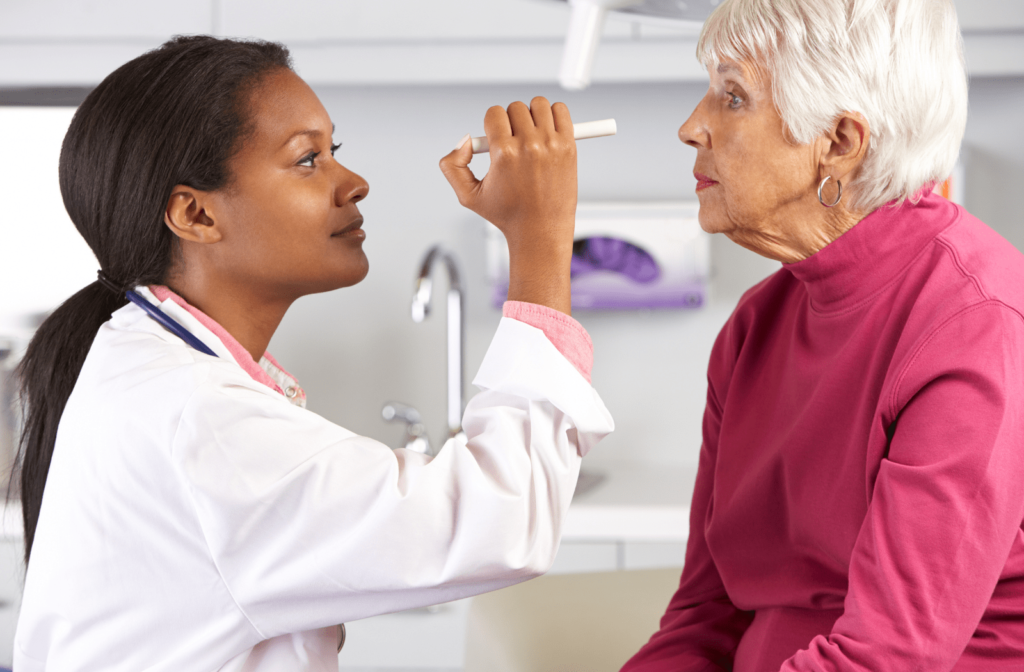Worldwide, the number of people with diabetes is rising. Today, there are more than 5.7 million Canadians living with diagnosed diabetes, and approximately one third of Canadians already have diabetes or prediabetes and don’t know it.
If left untreated, diabetes can lead to long-term complications. But how can you ensure your diabetes doesn’t go undiagnosed? Well, that’s where regular comprehensive eye exams come in.
We all know that eye exams are an important part of keeping our eyes and vision healthy, but they’re also crucial to maintaining our overall health as well. A comprehensive eye exam can not only lead to early detection of diabetes, but it can also help you manage existing diabetes.
At York Mills Eye Care, we offer services for everyone. If you have diabetes, book your next diabetic eye exam today! Until then, keep reading to learn more about the importance of eye exams, how diabetes affects your eye health, and what you can do to lower your risk of developing diabetic-related eye conditions.
Diabetes & Your Eye Health
Did you know that diabetes can affect your vision and eye health? In fact, diabetes is a leading cause of preventable blindness in Canada. In addition, people with diabetes are more likely to develop certain eye conditions like cataracts or glaucoma.
How Does Diabetes Affect Your Eyes?
Diabetes can cause damage to the blood vessels in the retina, the light sensitive tissue at the back of the eye. Rapid changes in blood sugar levels can also cause sugar to leak into the lens of the eye, causing swelling and blurred vision.
Diabetes affects your eyes when your blood glucose, also called blood sugar, is too high. When this happens, it can:
- Cause damage to the blood vessels in your retina, the light-sensitive tissue in the back of your eye
- Cause leaking into the lens of your eye, resulting in swelling and increased intraocular pressure
In the short term, you probably won’t notice any symptoms from an increase in blood sugar. Some people experience blurred vision, but it is typically temporary and your vision will return to normal when your blood sugar levels even out.
The damage to your retina occurs when your blood sugar stays high for a prolonged period. This damage can begin during prediabetes, making an early diagnosis crucial to protecting your eyes.
Types of Diabetic Eye Conditions
There are several types of diabetic eye conditions, including:
- Diabetic retinopathy
- Diabetic macular edema
- Cataracts
- Glaucoma
To protect your eyes from these conditions, ensure you see your eye doctor for a diabetic eye exam annually. Your optometrist can help you manage your symptoms, track changes in your eye health, and preserve your vision.
Eye Exams Vs. Vision Screenings
Now that you know how important eye exams are for detecting and managing diabetes, there’s one last thing to go over–the difference between eye exams and vision screenings. One of the most common misconceptions about eye exams is that they’re only testing your sight, but an eye exam is so much more!
What is a Vision Screening?
A vision screening, or a sight test, is a short exam that only tests your vision. While a vision screening can indicate a potential vision problem, they cannot be performed to diagnose exactly what is wrong.
What is an Eye Exam?
A comprehensive eye examination is a 30 to 60 minute exam performed by an optometrist or an ophthalmologist.
A comprehensive eye exams give your eye doctor an in-depth look at your vision and eye health and involves a series of tests. Common steps in an eye exam include:
- A review of your family and medical history
- An eye health evaluation
- Visual acuity testing
- Eye pressure testing
Only a comprehnsive eye exam can determine if your eyes and vision are healthy. After your exam, your eye doctor will be able to determine if the visual problems you are experiencing are normal or are disease-related. Then, they can get you any additional testing or treatment needed.
Reduce Your Risk
Yes, unmanaged diabetes can lead to vision loss and even blindness. But there are steps you can take to reduce your risk and protect your eyes, including:
- Control your blood sugar & blood pressure
- Maintain a healthy diet and avoid fried foods, sugary foods, & refined carbohydrates
- Get an annual diabetic eye exam
Have Questions?
If you ever have any questions about how diabetes affects your eye health, or your general eye health, our team is here for you! Contact us at York Mills Eye Care.




